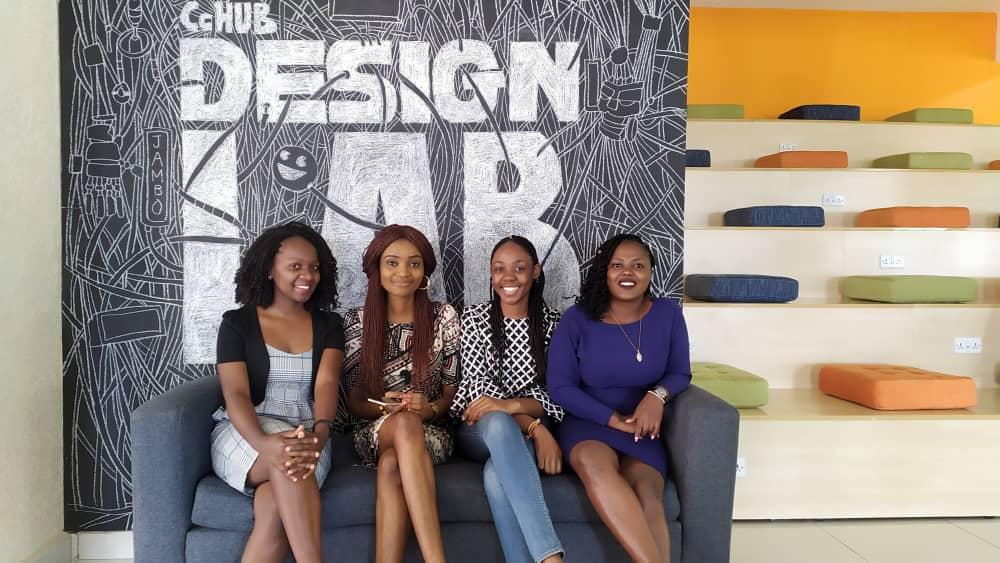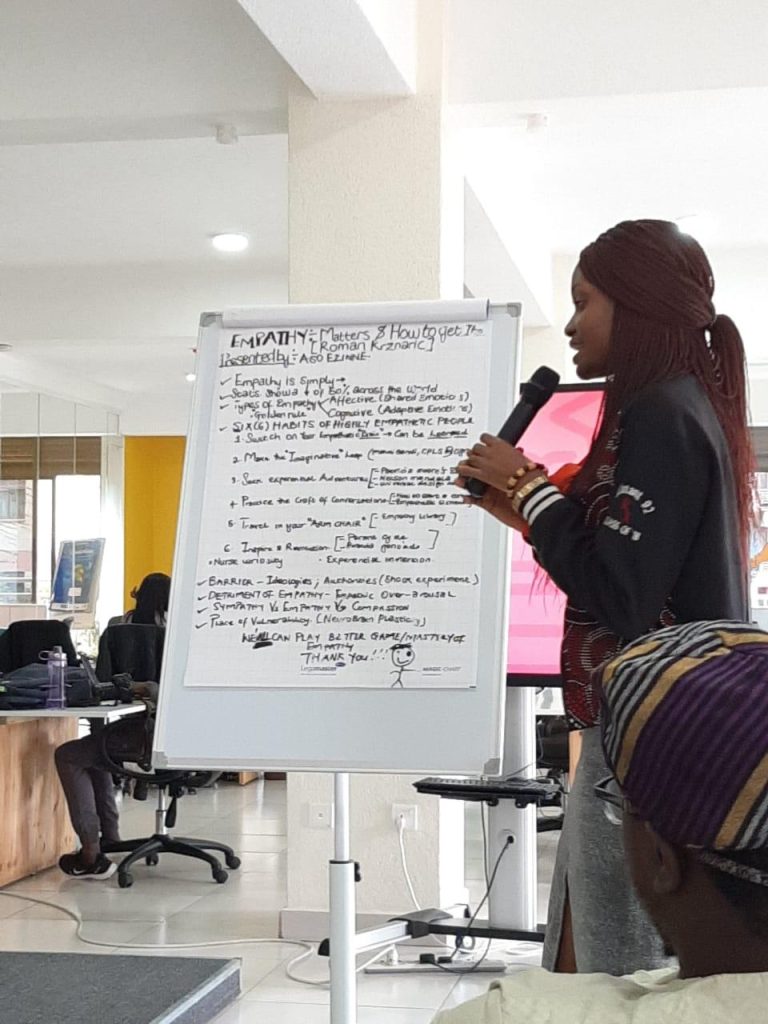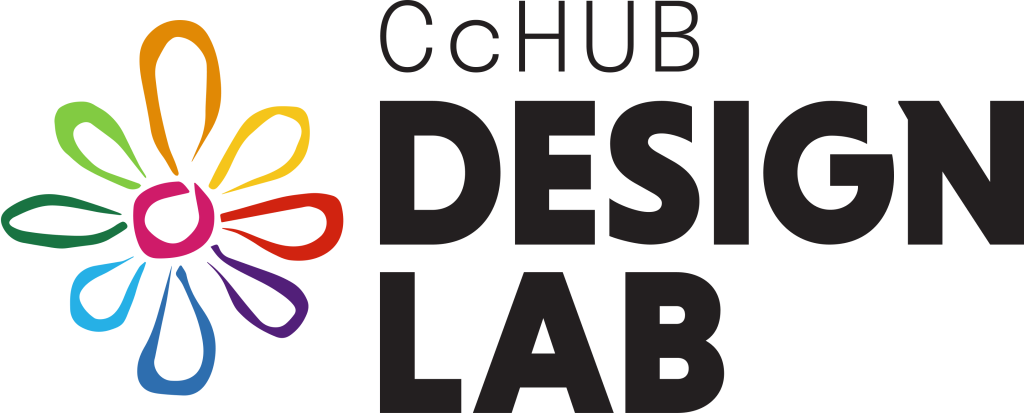I am super humbled and privileged to have been selected to be a part of the first cohort of the Co-creation Hub Design Lab Traineeship Programme.
We are being trained to be Africa’s finest Human-Centered Design (HCD) experts to design and coordinate sustainable solutions for Africa.
Day 1:
We arrived at the CcHUB Design Lab, at exactly 9:00 am and were welcomed by the Project Manager, Tomi Jaiyeola and other members of the Design Lab.
Meeting and exchanging pleasantries with other trainees from Across Africa: Burundi, Rwanda, Kenya, Uganda and Nigeria was super exciting.

Finally, Mr ‘Bosun Tijani, CEO and Co-founder of CcHUB gave us the Welcome Address and prepped with expectation setting and objectives for the programme.
We went through an exercise where we wrote out our goals and expected objectives for the design traineeship, our definition of success, our motivation and most importantly possible obstacles to achieving our goal.
Key Highlights of the talk:
- Choice of Honesty – Looking at oneself with a different perspective.
- Balance your Perception with Perspectives.
- Choices: Nothing has meaning, except the meaning you give them.
Empathy is not Sympathy.
‘Bosun Tijani the CEO of CcHUB gave his definition of empathy: “Empathy is a process through which we learn a new choice.
Paired into groups, we brainstormed on the topic of empathy.
To answer the question:
- What? – Does it mean not to be empathetic?
- Why? – Do people have Empathy?
- How? – Can we make People Empathetic?
All groups gave a presentation using a chart to show the journey of “How a person can go from not being empathetic to being empathetic
Later, we watched another video on “Empathy why it matters and how to get it” by Roman Krznaric. Major highlights from the videos were to be presented the next day by each participant.
Day 2:
Each trainee presented on the highlights from the video

6 Habits of Highly Empathetic People Were:
- Swing on Your Brain
- To make the imaginative leap of Empathy.
- Seek experiential adventures
- Practice the craft of conversations.
- Travel in your armchair
- Inspire a revolution.
We took turns in presenting our major lessons from the video.
After lunch, we had a cloud mapping session for the keywords for Empathy and we were able to assemble the basic words that simplified and defined empathy to us as a group. Afterwards, we had an expert session with Mr Patrick Buchana Nsenga, founder of a major transport logistics firm in Rwanda- Tap and Go.
He spoke to us about Empathy and how it affects the transport system. He also highlighted key facts like knowing your stakeholders, knowing your leverage, the place of thorough research in start-ups, dealing with Facts versus Assumptions, and the Art of questioning.
He said not to get too emotionally connected with the products, but build a brand of trust and be more solution conscious.
An effect he reffered to as the “The Stickiness Effect”
It was an insightful question and answer session.
Day 3:
We started the day with an ice breaker game, called Chinese Whispers, then a video on optimism called: How to be Optimistic Right Now. (Actualized.org)
Major highlights from the video:
- OPTIMISM is important for success in life – it’s a hopeful outlook for the future.
- PROBLEM: How permanent is this problem?
- PERVASIVENESS: How much does this affect?
- RESPONSIBILITY: Taking responsibility for every action both the good and bad.
After the video, we had a soul-searching exercise to list out 30 things we are most excited about achieving in the next six months.
This was followed by a focus group discussion for the keywords that defined Optimism to serve as reminders and a common mantra for us throughout the traineeship programme.
Major mantra
- Goals don’t care how you feel
- Just break the rules
- What we focus on expands
- Let the Pain Flow- go through the process
- Find a strong Why!
- Even when people give you the right thing you still have to accept.
- It’s not a bad life, it’s just a bad day.
After lunch, we started the session on Creative Confidence, coordinated by our Project Manager. We discussed the concept of Talent Versus Creativity and unanimously agreed that both required an effort but creativity can be learned by anyone and afterwards, we watched a Ted Talk by Tom Keller on Creative Confidence.
Major highlights from the video are:
- Guided mastery
- Self- Efficacy
- Turning fear into familiarity
- What stifles creativity (Doubt, Environment. Authority)
- The illusion of knowledge (If you don’t experience, You cannot Create!)
- Unconventional Vs Uncomfortable.
- Patience capital
- The Listening Agenda
Day 4
The trainees had an early morning session with a representative from the Rwanda Biomedical Centre (RBC). He walked us through the various operations carried out by RBC and the importance of constant research and action. He talked about the various health care facilities in Rwanda and expanded on the possible challenges we could be working on during the Practicum.
It was clear that Rwanda had achieved a high success rate in terms of her health care coverage and global status, however, he mentioned some of the challenges and set our expectations for the challenges ahead. We visited the Rwanda Genocide Memorial, and it was a great experience.
For the rest of the day, we worked on keywords for “Optimism” and “Creative Confidence.”
Day 5
Presentations were made on Creative Confidence by Tom and David Keller. After which, Mr Bosun Tijani took us through the remainder of the HCD Mindsets.
- Learning from failure
- Making it
- Iterate! Iterate! Iterate!
- Embrace Ambiguity
To wrap up the week on the mindsets of HCD, we also had a session on Emotional Intelligence. We all took an online personality test after which we discussed the different personality traits and how we can be emotionally intelligent.
Tomi took us through the topic of Emotional Intelligence, followed by a brief exercise to highlight the major traits in people we have worked with in the past and why we consider them the best.
We participated in an activity to highlight the three things we struggle with and three things we have mastered or excel at.
A major highlight from the session was the need for:
- Self-regulation
- Self-motivation
- Are social skills truly dependent on personality traits?
HIGHLIGHT OF THE WEEK
HCD MINDSET: This week was basically the setting of the Human-Centered Design mindset and the various expectation throughout the traineeship programme.
Week 2
Day 1:
Mr Bosun Tijani asked about the genocide experience and asked us to pool ideas for an article on the experience with key lessons.
He took us through the Four Phases of HCD using the diverge and converge diagram.
- THE UNDERSTAND PHASE which involves understanding the key problem. Finding insights, framing the challenge, selection of methods, interpretation of results.
- DISCOVER PHASE involving (Research methodology, inspiring designs, Formative research, viewing data with new lenses, Observing Vs Interpreting).
After his session, Dorcas Kareithi took us through the various methods of gathering data (Secondary Review, Fields studies and Interviews vs Discussions).
The art of framing questions and the tools for understanding (Affinity Maps, Process Modelling, Journey Maps, Personas etc)
We paid a visit to Zipline, a digital health firm in Rwanda aimed to solve the problem of delivery and quick supply of blood products across the country. The company operates with the drone delivery technology that delivers vaccines, antibiotics and blood and blood products to various health centres across Rwanda.
Day 3
The day started with a call with Obo Henshaw, who took us through the useful tools in the Understand Phase proceeded by a chat via Skype with Andrew Buhayar, a Gates Foundation representative.
Later in the day, we were paired into teams based on a certain identified health care challenges in the Rwanda health care system and asked to brainstorm through.
My team’s challenge was on the “Absence of the Inclusion of Vitamin A supplement into routine services.” Given primary data, we set to work on our secondary research and presented our results to the class.
Day 4
Led by the Director of Vaccine, Hassan Simbomana at the Maternal, Child and Community Health Division of Rwanda Biomedical Centre, the Trainees were given a tour through the Vaccine Centre in Rwanda. We inspected the facility and were taken through the basic standard operating procedures of the centre including stock-taking, procurement and supply system of vaccines by the Director.
My fellow trainees and I interfaced and conducted expert interviews with the staff on the challenges we had been given to solve.
Day 5:
Teams continued to work on their secondary research findings and expand on the ideas and insight from the visit to the Vaccine Center the previous day.
For the task for the day, we set for the Nyarugunga Health Care Centre for further inspection and expert interview and research.
We came back better enlightened as we had watched the vaccination process and procedures and interfaced with the real end-users of our possible solutions.
Week 3
Day 1
Upon presenting the problem statement of our assigned challenge, we had an intensive brainstorming session on the insights from our statements.
Fun Activity: Later that evening, we had dinner together at Pili-Pili.
Day 2
Our Facilitator, Obo Henshaw took us through the slides on the Co-creation Phase which involves:
- The bundling of ideas.
- Determining what to prototype
- Rapid prototyping.
We assembled our ideas and went through the rapid prototyping phase.
Day 3:
Each team presented on the prototype built for the solutions to their challenge.
Later in the day, we held an expert discussion with Laurelle May, a Representative from Girl Effect on the Human Papilloma Virus (HPV) Challenge where she gave us useful insights on our task.
Day 4:
We had a really insightful session with the team from RBC as we presented our solutions to them and got feedback on the solutions.
Day 5
Teams iterated on their solutions from the feedback received from the RBC team all day long.
Week 4
Day 1:
Obo took us through the implementation phase and gave us presentations on making road maps for the implementation of our solutions from ideas to real products or solutions in the hands of our end users.
She challenged each group to make journey maps of their solutions.
Day 2:
We learned how to make a detailed implementation plan including our figuring out who our likely partners will be, the funding and materials sourcing phases, as well as a calendar, to map out a plan detailing the activities to be carried out throughout the period of implementation.
Each trainee was then persuaded to make a detailed report of the total traineeship experience.
Later that day, we had a video call with Mr ‘Bosun Tijani and shared our journey so far as well as our prototype and solutions. He gave the team feedback and charged us to look ahead to the practicum.
Day 3:
The day started with a session via Zoom with one of our mentors, Adrian Jankowiak. Each team took him through our prototypes and challenges been worked on for the past few weeks. He commended us as well as gave feedback and ideas to amplify our solutions.
We had another call with another mentor: Alice Carter who is a product designer and HCD designer. She re-emphasized the need to be empathetic as well as the inclusion and/ or role of HCD in policymaking and design.
FUN ACTIVITY: We had the Designers’ dinner at the CcHUB House. It was really a fun moment of bonding and sharing of ideas. Another memory I am grateful to have made.
Day 4:
It is only a day left to the end of the 1-month Bootcamp session, and we are all emotional as it has been a worthwhile period.
We had another mentor chat with Kene Udeze, a Product Designer at booking.com as we shared with him all the work we had done, and solutions we had been working on. He gave us relevant feedback and encouraged us to communicate and connect.
We had another call with one of our mentor chat with Mariam Braimah, a Product Designer at Netflix. She told us about her background and how her journey to being a product designer.
Thanks again to the CcHUB Design Lab. The experience has been worthwhile.
Fun activities in pictures
Gratitude and Acknowledgement:
I thank God almighty for bringing this opportunity my way, I am truly grateful and super humbled to be a part of this Traineeship Programme.
I also want to thank the entire Co-Creation Design Lab team for accommodating us. Big thanks to Mr ‘Bosun Tijani and Tomi Jaiyeola for their selfless effort to bring this project to a reality.
I also want to thank Kome, Dorcas, Tunde, Jedidiah, Wale and our dear Obo for making this experience a memorable one for us all.
I look forward to being the most sought after HCD Designer in Africa.
To the World,
Ezinne Eke Aso
